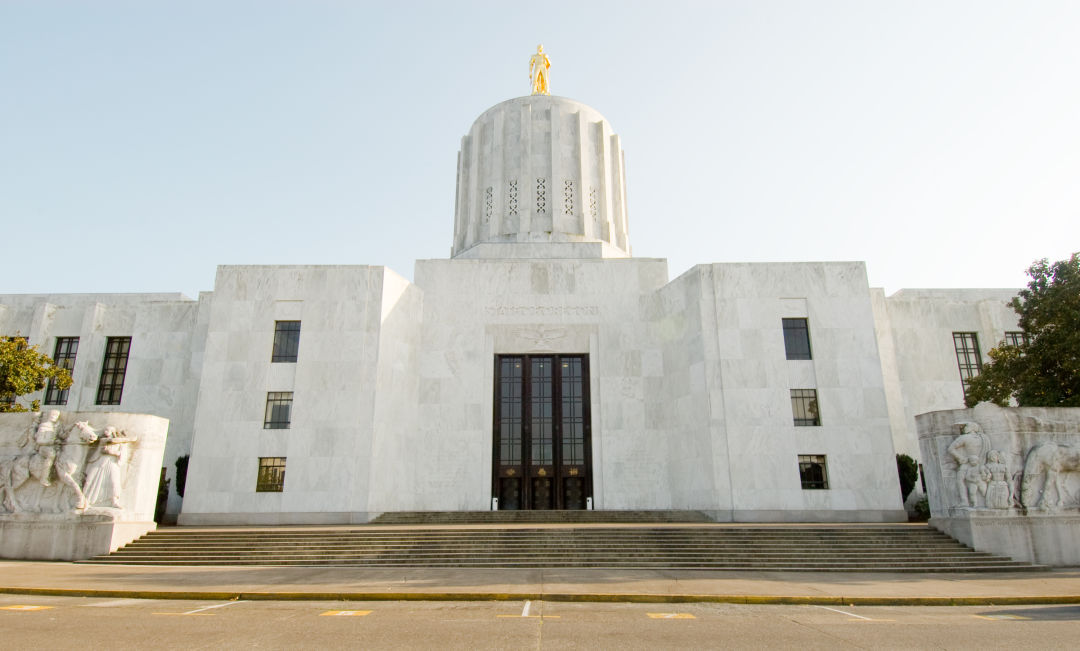Hear Ye, Hear Ye: The Oregon Legislature Is Now in Session

The state Capitol in Salem, which opened today for the 81st biannual legislative session.
The members of the Oregon Legislature convened for their 81st annual session Monday, under the twin shadows of the pandemic and last week’s violent insurrection in Washington, D.C.
Salem has seen its share of extreme right-wing protests, particularly in the past year, but thanks to the pandemic, entry into the building will be difficult at least for the foreseeable future (unless, of course, a friendly Republican wants to let you in via a side door.)
Currently, only lawmakers, staffers, and accredited journalists are allowed in the building. Public testimony will be taken remotely. In case you want to weigh in, here’s a look at the issues that are expected to claim top billing in Salem from now until the end of June.
Money, Money, Money
At its heart, every legislative session comes down to public dollars and cents—how much of it there is and how it should be spent. Governor Kate Brown kicked things off with a $25.6 billion proposal for the 2021-2023 two year budget cycle, which begins on July 1. It’s up to lawmakers to agree on which of her priorities to fund (or not.) Note that when the state went into lockdown last March, there were dire predictions about Oregon’s financial picture, most of which haven’t come to pass. State revenue is holding its own, according to Josh Lehner, an economist at the Oregon Office of Economic Analysis, thanks to direct federal aid, a stock market that just won’t quit, and a new corporate activities tax that kicks in this year.
But Not That Much Money
That doesn’t however, mean that there is money to burn. Education consumes the largest piece of Oregon’s budget pie; Brown’s budget calls for schools to be funded relatively close to 2019-2021 levels. Look for districts and teachers coping with safely reopening schools and addressing learning loss during this last year of mostly remote schooling to strongly argue for more investment. One area where Brown has said she wants to add more money: a big expansion of state-funded preschool programs.
The Legacy of 2020's Summer
The protests for racial justice and focus on law enforcement reform will be front and center this session in Salem, as never before. In particular, look for advocacy on police training and accountability, reforms to cash bail and mandatory minimum sentencing laws, and new funding for programs to ease re-entry post-parole.
The Rent is Due
Expect plenty more conversation about what to do when Oregon’s current moratorium on evictions for non-payment of rent is up on June 30. This is a classic “kick the can down the road” scenario for Oregon and elsewhere, though the state bought itself some breathing room last month by setting aside $150 million to compensate landlords for most—though not all–of any unpaid rent. Chances are high that landlords will try to push for programs, like tax credits, that will allow them to recoup the rest of what they are owed, while tenants’ rights groups seek permanent rent forgiveness.
And Now, for Something Completely Different
Spare a thought for what is unlikely to be on this year’s docket: cap and trade legislation. This effort to encourage a reduction in greenhouse gas emissions spurred two Republican walkouts in the 2019 session, bringing business in Salem to a halt. With such a full plate this year, Democrats are reportedly unlikely to bring this one back around. Another bill whose fate is uncertain is the perennial proposal to eliminate non-medical vaccine exemptions for schoolchildren. Our spidey sense tells us that the vaccine folks in Oregon have quite enough on their plate right now to be getting on with.




